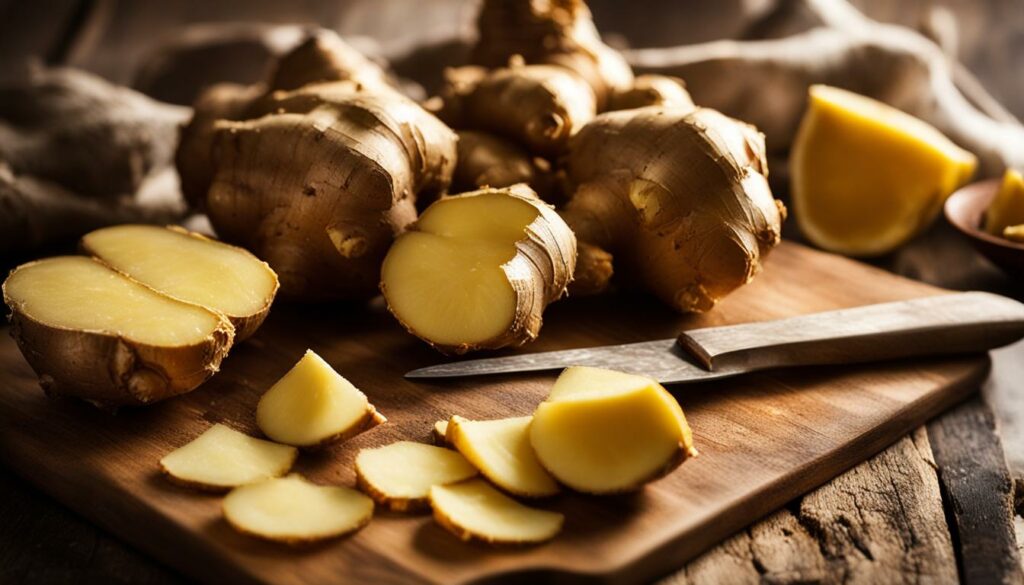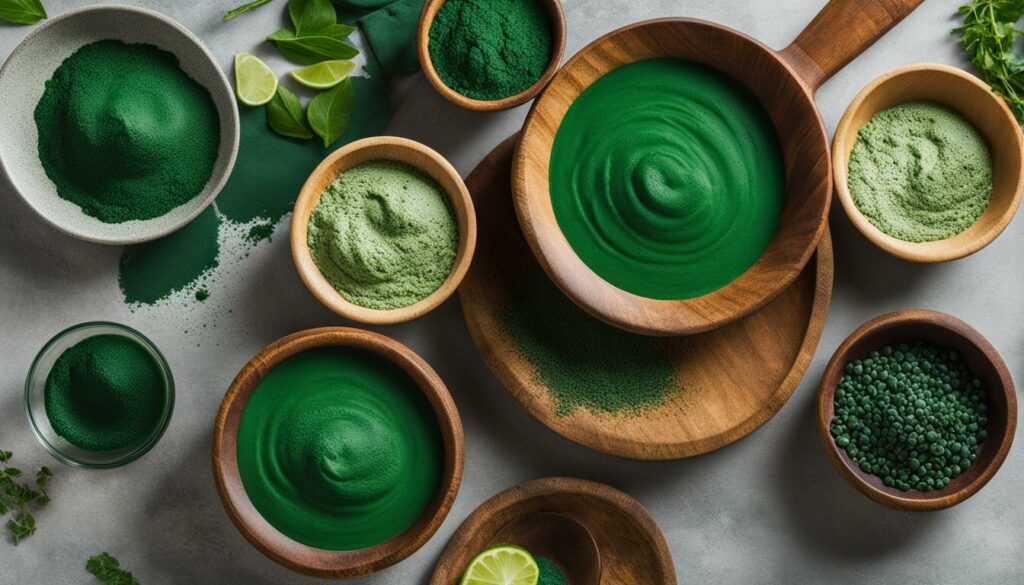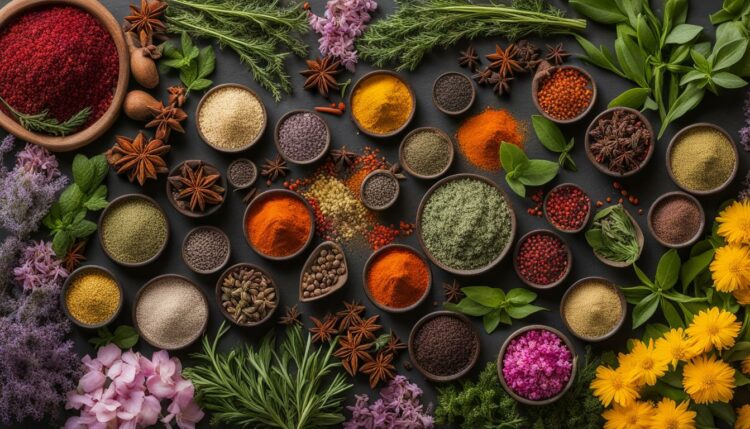The foods we eat play a major role in healthy aging and longevity. Some herbs and spices have anti-inflammatory and antioxidant properties that may support the immune system, protect against chronic conditions, and slow down the aging process.
Ginger, turmeric, spirulina, chili peppers, ginseng, and wild blueberries are six herbs and spices that have been found to have potential anti-aging benefits.
Key Takeaways:
- Ginger, turmeric, spirulina, chili peppers, ginseng, and wild blueberries are herbs and spices that can have potential anti-aging benefits.
- These herbs and spices contain anti-inflammatory and antioxidant properties that may support healthy aging and longevity.
- Incorporating these herbs and spices into your diet can help protect against chronic conditions and slow down the aging process.
- Consider adding ginger and turmeric to your meals, incorporating spirulina into your smoothie bowls, and enjoying the flavor and health benefits of chili peppers and ginseng.
- Remember to consult with a healthcare professional before making significant changes to your diet or starting any new supplements.
The Role of Inflammation in Aging and Disease
Inflammation plays a vital role in the body’s immune response, helping to protect against infection and injury. However, chronic inflammation has been linked to various age-related diseases and conditions. Lifestyle factors such as poor diet, sedentary behavior, and stress can contribute to increased inflammation levels.
The good news is that certain plants, including herbs and spices, contain compounds with anti-inflammatory properties that can help combat inflammation and its negative effects on aging and health. These natural ingredients have been used for centuries to promote well-being and longevity.
Inflammation and Aging
As we age, chronic low-grade inflammation becomes more common in the body. This type of inflammation is often referred to as “inflammaging” and is associated with numerous age-related diseases, such as cardiovascular disease, diabetes, cancer, and neurodegenerative disorders.
Scientists believe that this chronic inflammation contributes to the aging process by damaging cells and tissues, leading to the deterioration of organs and systems.
The Link Between Chronic Diseases and Inflammation
Chronic diseases, such as heart disease, diabetes, arthritis, and Alzheimer’s disease, are often characterized by elevated inflammation levels. Inflammation in these conditions can exacerbate symptoms and contribute to disease progression.
By managing inflammation, it may be possible to reduce the risk of developing chronic diseases and slow down the aging process. This is where the anti-inflammatory properties of plants, herbs, and spices come into play.
Anti-Inflammatory Properties of Plants
Many plants contain natural compounds that possess powerful anti-inflammatory properties. These compounds, such as polyphenols and flavonoids, can help regulate the body’s inflammatory response and reduce the production of pro-inflammatory molecules.
Herbs and spices like ginger, turmeric, cinnamon, rosemary, and garlic are known for their potent anti-inflammatory effects. Incorporating these ingredients into your diet may help lower inflammation levels and support healthy aging.
Antioxidants and Aging
In addition to their anti-inflammatory properties, plants also contain high levels of antioxidants. Antioxidants help neutralize harmful free radicals in the body, reducing oxidative stress and cellular damage.
Oxidative stress is a major contributor to aging and age-related diseases. By consuming foods rich in antioxidants, such as berries, green tea, dark chocolate, and colorful fruits and vegetables, you can help protect your cells from damage and slow down the aging process.
In conclusion, inflammation plays a pivotal role in the aging process and the development of chronic diseases. By incorporating anti-inflammatory plants, herbs, and spices into your diet, you can help manage inflammation, reduce the risk of age-related diseases, and promote a healthier and longer life.
The Power of Ginger for Anti-Aging
Ginger, a powerful herb with anti-inflammatory and antioxidant effects, holds great potential for anti-aging. One of the key compounds found in ginger is gingerol, which has been shown to possess anti-inflammatory and anti-cancer properties.
To fully harness the anti-aging benefits of ginger, it is recommended to consume it a few times a week. There are various ways to incorporate ginger into your diet:
- Fresh Extract: Extract the juice from fresh ginger roots and consume it directly or mix it with other beverages for a refreshing boost of anti-aging goodness.
- Grated into Food: Grate fresh ginger and add it to your dishes such as stir-fries, sauces, or marinades to infuse them with a subtle, spicy flavor and potent anti-aging properties.
- Added to Tea: Slice fresh ginger and steep it in hot water to create a soothing and rejuvenating ginger tea. Enjoy this warm beverage while benefiting from its anti-inflammatory and antioxidant effects.
- Ginger Shots: Blend ginger with other ingredients like lemon, turmeric, and honey to create a powerful ginger shot. These concentrated doses of ginger can provide a quick and potent boost of anti-aging properties.
Here’s a simple recipe for a ginger shot:
Ginger Shot Recipe:
- 1 small piece of fresh ginger (about 1 inch)
- 1 small lemon, juiced
- 1 teaspoon of honey (optional)
- A pinch of turmeric powder (optional)
Blend all the ingredients together until smooth. Pour the mixture into a shot glass and consume it in one go. Feel the invigorating and anti-aging effects of this powerful ginger shot.
By incorporating ginger into your diet regularly, you can harness its anti-inflammatory, antioxidant, and anti-aging properties to support overall health and well-being.

Turmeric: The Golden Spice for Longevity
Turmeric, known for its vibrant golden color, is more than just a culinary spice. It contains curcumin, a powerful antioxidant compound that has been linked to various health benefits, including anti-aging effects.
Curcumin has been found to possess anti-inflammatory properties, making it a popular choice for those seeking natural remedies for inflammatory conditions and age-related diseases.
One of the key areas where turmeric and its active compound curcumin show promise is brain health. Research suggests that curcumin may help protect against age-related cognitive decline and support overall brain function.
By reducing inflammation and oxidative stress, curcumin may enhance cognitive performance and potentially reduce the risk of neurodegenerative diseases such as Alzheimer’s.
To reap the full benefits of curcumin, therapeutic dosing of turmeric is recommended. While adding turmeric to your meals can provide some health benefits, incorporating a curcumin supplement into your daily routine is an effective way to ensure you’re getting sufficient doses of this potent antioxidant. It is advised to take curcumin supplements with meals to enhance absorption.
Aside from supplements, turmeric can be enjoyed in various delicious forms. One popular way to consume turmeric is through golden lattes, which combine turmeric, milk (or plant-based milk), and other warming spices for a cozy and nutritious beverage. Turmeric can also be added to soups, stews, and curries to infuse dishes with its distinct flavor and beneficial properties.
Turmeric: Anti-Aging Benefits
Here are some key reasons why turmeric is considered a golden spice for longevity:
| Benefits of Turmeric for Anti-Aging |
|---|
| 1. Anti-inflammatory properties |
| 2. Potential brain health support |
| 3. Reduction in age-related diseases |
Turmeric’s anti-inflammatory properties can help combat chronic inflammation, a major contributing factor in the aging process and the development of age-related diseases. By reducing inflammation, turmeric can support overall health and well-being, contributing to a longer and healthier life.
Furthermore, the potential brain health benefits of turmeric make it a valuable addition to any anti-aging regimen. Protecting cognitive function and reducing the risk of neurodegenerative diseases can help maintain mental clarity and vitality as we age.
In summary, turmeric and its active compound curcumin offer a natural and effective way to support healthy aging and promote longevity.
By incorporating therapeutic dosing of turmeric into your daily routine through supplements or culinary preparations, you can harness the anti-inflammatory, antioxidant, and brain-protective properties of this golden spice.
The Benefits of Spirulina for Longevity
Spirulina, a type of algae, offers numerous benefits for healthy aging and longevity. It is not only rich in protein but also packed with essential vitamins and minerals, making it a valuable addition to any diet.
One of the most impressive aspects of spirulina is its high protein content. With protein comprising around 60-70% of its dry weight, spirulina is an excellent source of plant-based protein. This is particularly beneficial for those looking to maintain muscle mass and support overall health as they age.
Moreover, spirulina possesses powerful antioxidant properties, which can help fight off free radicals and reduce inflammation in the body. These antioxidant effects contribute to a healthier aging process, potentially slowing down the development of age-related conditions.
In addition to its protein and antioxidant content, spirulina also supports immune health. Its unique blend of vitamins, minerals, and bioactive compounds can enhance the functioning of the immune system, helping individuals maintain their health and vitality as they grow older.
Spirulina can be easily incorporated into various recipes and dishes. One popular way to enjoy its benefits is by adding spirulina powder to smoothie bowls. The vibrant green color and subtle taste of spirulina complement the other ingredients, creating a nutritious and visually appealing meal.
| Benefits of Spirulina | How to Incorporate Spirulina into Your Diet |
|---|---|
| ✓ High protein content supports muscle health and overall well-being | ✓ Add a spoonful of spirulina powder to your favorite smoothie bowl recipe |
| ✓ Rich in antioxidants that combat free radicals and reduce inflammation | ✓ Mix spirulina powder into homemade energy balls or protein bars for a nutritious boost |
| ✓ Boosts immune health with its unique blend of vitamins and minerals | ✓ Sprinkle spirulina powder over salads or roasted vegetables for an added nutritional punch |
| ✓ Provides essential nutrients to support healthy aging and longevity | ✓ Blend spirulina powder into your favorite green smoothie recipe for a nourishing treat |
Incorporating spirulina into your diet can be a simple yet effective way to promote longevity and enhance your overall well-being. Whether you choose to enjoy it in smoothie bowls, energy balls, or mixed into various dishes, spirulina is a natural, nutrient-dense superfood that offers a wide range of benefits for healthy aging.

Chili Peppers: Adding Spice to Longevity
Chili peppers are not only a source of heat in cuisine but also pack a punch when it comes to longevity. These fiery peppers contain a powerful compound called capsaicin, responsible for their spicy flavor.
Capsaicin has been found to have antioxidant and anti-inflammatory properties, making chili peppers a potent ingredient for promoting overall health and anti-aging benefits.
Research suggests that capsaicin may offer various health benefits, including:
- Reduced risk of chronic diseases: Capsaicin has been associated with a lower risk of cancer, cardiovascular disease, and neurodegenerative disorders.
- Enhanced metabolism: Capsaicin has thermogenic properties, which can help boost metabolism and support weight management.
- Pain relief: Topical capsaicin creams and patches have been used for pain relief, particularly for conditions like arthritis.
- Improved digestion: Capsaicin may help stimulate digestion, promoting a healthy gut and potentially easing digestive issues.
To fully enjoy the benefits of capsaicin, it is recommended to incorporate chili peppers regularly into your diet. Whether added fresh, dried, or in the form of chili pepper powder or sauces, there are plenty of delicious ways to spice up your meals and promote longevity.
So, don’t shy away from the heat! Embrace the power of chili peppers and savor the benefits they offer for anti-aging and overall health.
Ginseng: An Ancient Herb for Longevity
Ginseng, a medicinal herb that has been used for centuries in various cultures, is renowned for its anti-aging properties. With its adaptogenic properties, ginseng helps the body cope with stress and supports immune function.
One of the key benefits of ginseng is its ability to act as an adaptogen, which means it helps the body adapt to physical and mental stressors. By reducing the negative effects of stress on the body, ginseng supports a healthy aging process.
In addition to its adaptogenic properties, ginseng has antioxidant and anti-inflammatory properties. These qualities make it a potent ally in combating signs of aging and maintaining overall health. Ginseng may also have positive effects on blood sugar control, learning, and memory.
Ginseng comes in various forms, making it accessible to different preferences and needs. Whether it’s ginseng tea, powdered ginseng for consumption, ginseng capsules, or ginseng tinctures, there are plenty of options to choose from to incorporate this ancient herb into your daily routine.
FAQ
Can herbs and spices help with anti-aging and longevity?
Yes, some herbs and spices have anti-inflammatory and antioxidant properties that may support the immune system, protect against chronic conditions, and slow down the aging process.
How can inflammation impact aging and disease?
Excess inflammation has been associated with chronic diseases and age-related conditions. Lifestyle habits, such as poor diet and lack of exercise, can contribute to heightened inflammation.
Which herb is known for its anti-inflammatory and antioxidant effects?
Ginger is a powerful herb with anti-inflammatory and antioxidant effects. It contains a compound called gingerol, which has been found to have anti-inflammatory and anti-cancer properties.
How can I incorporate ginger into my diet?
Ginger can be used in various forms, such as fresh extract, grated into food, added to stir-fries, or sliced in tea. Ginger shots, made by blending ginger with other ingredients, are also a popular way to enjoy the benefits of ginger.
What compound in turmeric has anti-inflammatory properties?
Turmeric contains the antioxidant compound curcumin, which has been found to have anti-inflammatory properties and may improve brain health.
How can I consume turmeric for its health benefits?
Turmeric can be incorporated into various dishes and beverages, such as golden lattes and soups. It is recommended to take a curcumin supplement with meals for the full health benefits of turmeric.
What is spirulina and how can it promote longevity?
Spirulina is a type of algae high in protein and packed with vitamins and minerals. It has antioxidant properties and may help fight free radicals and reduce inflammation.
How can I include spirulina in my diet?
Spirulina supplements can be beneficial for healthy aging as they provide essential nutrients and support immune health. It can be added to smoothie bowls or used in various recipes to boost overall health and longevity.
What compound in chili peppers provides health benefits?
Chili peppers contain a compound called capsaicin, which has antioxidant and anti-inflammatory properties.
How can chili peppers contribute to overall health and longevity?
Regular consumption of spicy foods, which contain capsaicin, has been linked to a lower risk of dying from all causes.
What are the benefits of ginseng for anti-aging?
Ginseng is a medicinal herb with adaptogenic properties. It helps the body cope with stress, supports immune function, and has antioxidant and anti-inflammatory properties.
In what forms is ginseng available for consumption?
Ginseng is available in various forms, such as tea, powder, capsule, and tincture.




